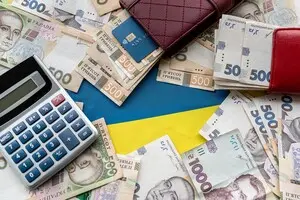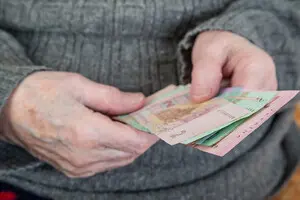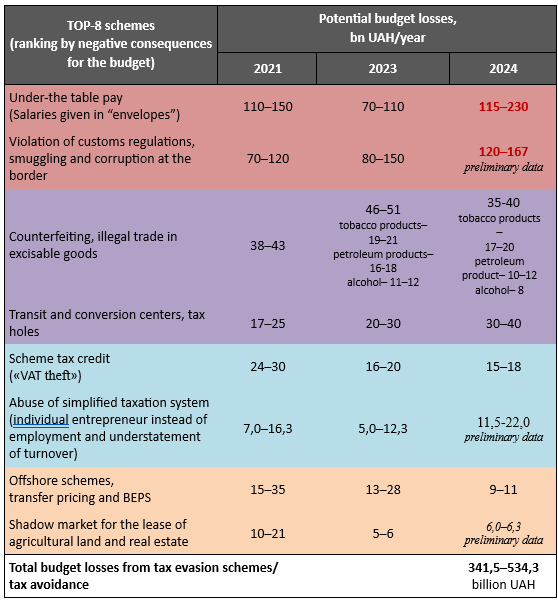Tax Evasion Schemes Today: What's Wrong with Taxes in Ukraine
Taxes are the sinew of war.
Thomas Sargent, Nobel Prize laureate
In general, war as a great evil will cost Ukraine enormous economic losses. While our brave defenders are defending the country, and taxpayers are conscientiously filling the budget, and in volumes significantly larger than last year (as of November 1, 2024, UAH 916.2 billion was paid to the state budget, which is UAH 208.1 billion, or 29.4%, more than in the corresponding period last year), tension is increasing in society and a heated discussion is ongoing regarding the state's policy of further direct growth of tax pressure.
Ways to avoid taxation
The fiscal approach has already been enshrined in the updated Memorandum with the International Monetary Fund (IMF), approved by the government's National Revenue Strategy until 2030, and is partially embodied in Law No. 4015 on increasing taxes in 2024 (awaiting the president's signature). In other words, in the future, the government's response to all new budget needs, including military ones, will become standard, namely an increase in taxes.
Perhaps the only reasonable alternative to such an approach is to find other sources of filling the treasury of our country with money, primarily through de-shadowing of the economy, that is, due to the fact that it will become more transparent and understandable. In addition, an important solution may also be the gradual closure of opportunities for tax evasion, increasing the level of voluntary compliance with the requirements of the law. However, such large-scale work is possible only if there is a clear understanding and assessment of budget losses from the largest instruments (schemes) of tax evasion and tax non-payment in Ukraine.
It should be noted that the set of tax evasion tools used in Ukraine generally not much different from other countries, but has its own characteristics and trends:
✓ violation of customs rules (manipulation of the customs value of goods, abuse of customs privileges / regimes at the border – "postal" and "transit" schemes, the "ants" scheme) and smuggling;
✓ abuse in the field of value added tax collection (“VAT theft”, “black grain”);
✓ transfer of profits to “tax havens” (offshores), abuse of international agreements (treaty hopping);
✓ schemes of the shadow market for renting land and real estate;
✓ counterfeiting, illegal trade in excisable goods;
✓ distortion of the tax base, minimization of declared profits, etc., in particular through the so-called transit and conversion centers (“miscoding” and “drop” schemes);
✓ shadow wages and abuse of tax benefits (deductions), preferences and special tax regimes (structuring of business through pseudo-individual entrepreneurs operating on pseudo-trading platforms and/or under pseudo-franchises).
The volume of the largest schemes
A detailed classification of the most common schemes and calculations of their scale make it possible to assess the most problematic areas where the state needs make efforts to combat tax evasion and tax non-payment.
The macroeconomic scale of the most common tax evasion schemes is impressive, as it reaches an economic turnover of more than 1.3 trillion UAH per year, or 17.4% of the country's official Gross Domestic Product (GDP). Some of the schemes are successfully developing and growing, while others have been minimized in recent years. The leaders are "smuggling and abuse at the border", as well as "salaries given to employees in envelopes" (budget losses amount to 120–167 billion and 115–230 billion UAH per year, respectively).
These two schemes are the leaders during the war in terms of budgetary consequences: they have regained their positions from the undisputed champion of previous years, namely offshore. Moreover, the currency restrictions of the war have led to sometimes quite abnormal growth of internal tax optimization tools (black wages and transit issues) and a narrowing of external ones (such as profit shifting abroad). The trend of 2024 was the renaissance of the transit and conversion center industry, in particular money laundering schemes using “drops” (“mules”), which increased to annual volumes of UAH 200–250 billion.
The results of the work of regulatory and law enforcement agencies in 2023–2024 to combat “VAT theft”, that is, the use of VAT paid upon import of goods to offset VAT paid upon further processing within the country, can be characterized as a gradual and moderate restoration of state control over the completeness of tax collection. However, today there is no reason to believe that value added tax (VAT) evasion schemes have been at least partially overcome. Ukraine still needs further modernization of the tax administration system both in terms of terminating the schemes and increasing its friendliness and comfort for taxpayers.
Negative processes also continue in the market of excisable goods – mostly the market of alcohol, fuel and tobacco, which have traditionally been the leaders of the informal economy. The state has begun to fight the excise "shadow" most actively over the past ten years, which has yielded certain results:
- according to the State Tax Service of Ukraine, additional revenues from alcoholic beverages produced in Ukraine showed an almost double increase;
- the size of the "shadow" in the fuel market in 2023 decreased by 21 basis points (to 13%) compared to 2022;
- for the first time since 2016, a certain stop was noted in the attack of the shadow economy on the tobacco sector.
However, will this success become a trend in the coming years or just an intermediate stage before further European integration-related increases in excise rates, time will tell. At least the experience of the European Union shows that the shadow market increases if excise rates grow too quickly and are suboptimal. In addition, the state is unable to cover negative processes with its control (weak institutional capacity of regulatory and law enforcement agencies).
Offshore schemes and cross-border transfer of profits due to war, currency restrictions and high rising cost of service due to new global standards of tax transparency (antiBEPS, FATCA, ATAD, BEPS 2.0, KIK and others) are increasingly acquiring signs of "elitism", that is, they remain available only to large Ukrainian companies and wealthy Ukrainians. The volume of transfer of profits abroad is at a historically low level.
Tax evasion structure
Changes to legislation, war, millions of refugees and other factors have led to an increase in the volume of abuses under certain schemes (conversion and / or transit centers - tax holes, "miscoding", "drops"; salaries received by employees in "envelopes"; violation of customs rules, smuggling and corruption at the border). In addition, at the same time, all of the above factors have also led to a decrease in abuses under other schemes (primarily offshore schemes and BEPS, as well as "VAT theft", abuse, schemes in the agricultural sector). Other popular tax evasion/ tax non-payment tools demonstrate different trends. However, the issue remains extremely relevant. Namely, it is worth noting that the total budget losses under the most common tax avoidance schemes reach UAH 340–530 billion per year.
In general, the additional fiscal potential from overlapping schemes is huge – from 4.6 to 7.1% of the Gross Domestic Product, which, if there is political will, is both part of the global response to the task of finding "500 billion UAH for defense" and the general irrelevance of the policy of aggressive pressure on business and the increase in taxes planned for 2025–2027.
***
Ensuring the rule of law, as soon as possible rebooting such institutions as the State Migration Service of Ukraine, the State Tax Service of Ukraine, and the Bureau of Economic Security of Ukraine by commissions with a majority vote of international experts remain key recommendations of think tanks for minimizing "gray" schemes.
Please select it with the mouse and press Ctrl+Enter or Submit a bug
















 Login with Google
Login with Google